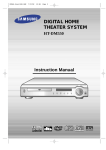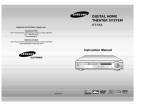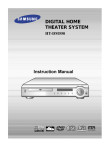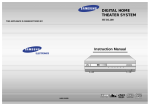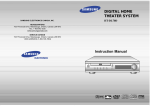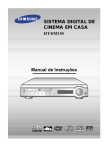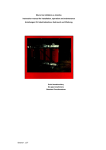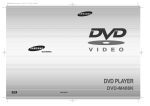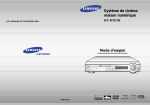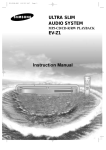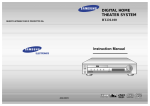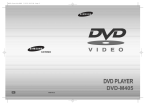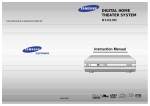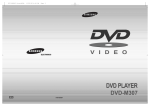Download Samsung HT-DM150 User Manual
Transcript
DIGITAL HOME THEATER SYSTEM HT-DM150 Instruction Manual COMPACT VIDEO DIGITAL AUDIO COMPACT DIGITAL VIDEO Safety Warnings CLASS 1 LASER PRODUCT KLASSE 1 LASER PRODUKT LUOKAN 1 LASER LAITE KLASS 1 LASER APPARAT PRODUCTO LASER CLASE 1 Use of controls, adjustments or performance of procedures other than those specified herein may result in hazardous radiation exposure. CAUTION-INVISIBLE LASER RADIATION WHEN OPEN AND INTERLOCKS DEFEATED, AVOID EXPOSURE TO BEAM. CAUTION RISK OF ELECTRIC SHOCK. DO NOT OPEN CAUTION: TO REDUCE THE RISK OF ELECTRIC SHOCK, DO NOT REMOVE REAR COVER. NO USER SERVICEABLE PARTS INSIDE. REFER SERVICING TO QUALIFIED SERVICE PERSONNEL. This symbol indicates that dangerous voltage which can cause electric shock is present inside this unit. This symbol alerts you to important operating and maintenance instructions accompanying the unit. WARNING: To reduce the risk of fire or electric shock, do not expose this appliance to rain or moisture. CLASS 1 LASER PRODUCT This Compact Disc player is classified as a CLASS 1 LASER product. 1 CAUTION: TO PREVENT ELECTRIC SHOCK, MATCH WIDE BLADE OF PLUG TO WIDE SLOT, FULLY INSERT. Precautions Ensure that the AC power supply in your house complies with the identification sticker located on the back of your player. Install your player horizontally, on a suitable base (furniture), with enough space around it for ventilation (3~4inches). Make sure the ventilation slots are not covered. Do not stack anything on top of the player. Do not place the player on amplifiers or other equipment which may become hot. Before moving the player, ensure the disc tray is empty. This player is designed for continuous use. Switching off the DVD player to the stand-by mode does not disconnect the electrical supply. In order to disconnect the player completely from the power supply, remove the main plug from the wall outlet, especially when left unused for a long period of time. During thunderstorms, disconnect the main plug from the socket. Main voltage peaks due to lightning could damage the unit. Do not expose the unit to direct sun radiation or other heat sources. This could lead to overheating and malfunction of the unit. Phones Protect the player from moisture(dripping or splashing and that no objects filled with liquids,such as vases, shall be placed on the player), and excess heat(e.g.fireplace) or equipment creating strong magnetic or electric fields (i.e.speakers...) disconnect the power cable from the mains electricity supply if the player malfunction. Your player is not intended for industrial use but for domestic purposes only. Use of this product is for personal use only. Condensation If your player or disc have been stored in a cold atmosphsre. as for example during transportation in the winter, wait for approximately 2 hours until they have reached room temperature. The battery used in this product contains the chemicals that are harmful to the environment. Do not dispose of batteries in the general household waster. It is recommended that the replacement of the battery should be done by technician. 2 DVD (Digital Versatile Disc) offers fantastic audio and video, thanks to Dolby VIDEO 1 ~ 6 Digital surround sound and MPEG-2 video compression technology. Now you can enjoy these realistic effects in the home, as if you were in a movie theater or concert hall. DVD players and the discs are coded by region. These regional codes must match in order for the disc to play. If the codes do not match, the disc will not play. The Region Number for this player is given on the rear panel of the player. (Your DVD player will only play DVDs that are labeled with identical region codes.) Do not use the following types of disc! • LD, CD-G, CD-I, CD-ROM and DVD-ROM cannot be played on this player. • If such discs are played, a "WRONG DISC FORMAT" message appears on the TV screen. DVD discs purchased abroad may not play on this player. If such discs are played, a "WRONG REGION CODE" message appears on the TV screen. Copy Protection • Many DVD discs are encoded with copy protection. Because of this, you should only connect your • 3 DVD player directly to your TV, not to a VCR. Connecting to a VCR results in a distorted picture from copy-protected DVD discs. This product incorporates copyright protection technology that is protected by methods claims of certain U.S. patents and other intellectual property rights owned by Macrovision Corporation and other rights owners. Use of this copyright protection technology must be authorized by Macrovision Corporation, and is intended for home and other limited viewing uses only unless otherwise authorized by Macrovision Corporation. Reverse engineering or disassembly is prohibited. Contents CHAPTER 4. PREPARATION SETUP Safety Warnings Precautions Description Remote Control Listening on headphones 1 2 5 7 8 Setting up the Language Features System Setup Speaker Setup To set up Speaker Balance Creating Realistic Sound Fields Dolby Pro Logic II decoder DSP (Digital Signal Processor) Modes Adjusting DSP Sound Parameters CONNECTIONS Connecting the Speakers Connect Video to TV Connecting the FM and AM(MW/LW) Antennas AUX Connections Controlling a TV with the Remote Before Using the DVD Player CHAPTER 5. RADIO OPERATION Listening to the Radio Presetting stations SETUP Connecting your System to the Power Supply 9 10 11 12 13 13 14 28 29 31 33 34 35 37 38 38 OPERATION To increase Effect level CHAPTER 2. PREPARATION CONNECTIONS CHAPTER 1. 39 40 CHAPTER 3. DVD Playback MP3-CD Playback Forward/Reverse Searching Slow Playback/Checking the Remaining Time Repeat Playback Using Disc Menu/Title Selecting the Audio Language/Subtitle Language Zoom/Angle Functions Program Playback Sleep/D.R.C Function 15 17 19 20 21 22 23 24 25 27 RADIO OPERATION MISCELLANENOUS OPERATION CHAPTER 6. MISCELLANENOUS Troubleshooting Cautions on Handling and Storing Discs Disc Type and Protection Specifications Reference 41 43 44 45 46 4 Description Front Panel Function button Play/Pause ( Power ( ) button Volume control Stop ( ) button ) button Disc Tray Open/Close button Standby indicator Headphone Jack Tuning Down & Skip ( ) buttons Tuning Up & Skip ( ) buttons Display TUNER indicator TITLE indicator DTS Disc indicator PRO LOGIC indicator PRO LOGIC D I G ITAL MPEG indicator STEREO indicator TUNED ST MPEG PBC indicator DSP indicator PROGRAM RADIO FREQUENCY indicator indicator PROGRAM TITLE LINEAR PCM L C R LFE LS S RS SPEAKER indicator DOLBY DIGITAL indicator 5 System Status Display PBC MHZ DSP KHZ PREPARATION Rear Panel Video Output Connector External Video Component Input Connector Connect the TV's video input jacks (VIDEO IN) to the VIDEO OUT connector. S-Video Output Connector External Digital Component Input Connectors If the TV is equipped with an S-Video input connector (S-VIDEO IN), connect it to the player's S-Video output jack. Use these for connections to external equipment capable of digital output. AM Antenna Connector FM Antenna Connector 5.1 Channel Speaker Output Terminals External Audio Component Input Connector Voltage Selector(option) COMPONENT VIDEO OUTPUT/INPUT jacks Connect a TV with component video input jacks to these jacks. Accessories Remote Control Video/Audio Cable AM Antenna FM Antenna User's Manual 6 Remote Control Unit DVD POWER button TV TV Power button DVD button TUNER button AUX button Open/Close button Title button Menu button Audio MO/ST(mono/stereo) button Subtitle button Display button TV/VIDEO TV/VIDEO button Channel TV Channel Selection button Volume TV Volume Control button Play/Pause button Stop button Tuning Preset/CD Skip button Tuning Up/Down/CD Search button Return button Direction/Enter button Volume Control buttons Speaker output volume control DSP/DPL II Mode button DSP/DPL II Effect button Number(0~9) buttons Slow button Angle button Repeat button TV System/Zoom button Sleep button Mute button Sound Edit button SPK Mode button Pro Logic II button Test Tone button Clear button Step button Setup button Repeat A↔B button Remain button Go To button Program button D.R.C button 7 Insert Remote Batteries 1 3 Insert two 1.5V AAA batteries, paying attention to the correct polarities (+ and –). The remote control can be used up to approximately 23 feet/7 meters in a straight line. It can also be operated at a horizontal angle of up to 30° from the remote control sensor. 30 30 7~10m Replace the battery cover. Follow these precautions to avoid leaking or cracking cells: • Place batteries in the remote control so they match the CAUTION polarity:(+) to (+)and (–)to (–). • Use the correct type of batteries.Batteries that look similar may differ in voltage. • Always replace both batteries at the same time. • Do not expose batteries to heat or flame. To open the remote control cover, push the top of the cover, then slide downward. Listening on headphones Listening on headphones Use headphones (not supplied) for private listening pleasure. Connect the headphones to the HEADPHONES jack of the front panel. • No sound is produced from the speakers. • To prevent hearing damage, do not raise the volume level excessively when using headphones. HEADPHONE jack 8 PREPARATION 2 Remove the battery cover on the back of the remote by pressing down and sliding the cover in the direction of the arrow. Range of Operation of the Remote Control Connecting the Speakers Left front speaker Center speaker Right front speaker Subwoofer • Connect the satellite speakers, center speaker, and subwoofer to the terminals on the rear panel using speaker cords supplied. • Connect the red cord to the red (+) terminal and the black cord to the black (-) terminal. Left rear speaker 1 2 3 Right rear speaker Press and hold the terminal tab. 1 Insert the speaker cord. Release the finger. 2 Red Black Subwoofer Left rear speaker Right rear speaker Center speaker Right front speaker Left front speaker • For details on the “Ideal Speaker Placement” see page 32. 9 3 Connect Video to TV CONNECTIONS TV Composite Video * S-Video Component Video Depending on your TV, Component Video input connectors may be marked as DVD Video input connectors. Composite Video (Good Quality) Connect the supplied video cable from the VIDEO OUT jack on the back panel of the system to the VIDEO IN jack on your television. S-Video (Better Quality) If you television is equipped with an S-Video input, connect an S-Video cable (not supplied) from the S-VIDEO OUT jack on the back panel of the system to the S-VIDEO IN jack on your television. Component Video (Best Quality) If your television is equipped with Component Video inputs, connect a component video cable (not supplied) from the Pr, Pb and Y jacks on the back panel of the system to the corresponding jacks on your television. • When the Progressive scan mode is selected, the VIDEO and S-VIDEO outputs do not feed any signals. 10 Connecting the FM and AM(MW/LW) Antennas If AM reception is poor, connect an outdoor AM antenna(not supplied). 1 2 3 If FM reception is poor, connect an outdoor FM antenna (not supplied). AM Loop Antenna (supplied) ANTENNA Snap the tabs on the loop into the slots of the base to assemble the AM loop antenna. FM Antenna (supplied) Cooling fan (See “About Cooling Fan” below.) FM antenna connection 1. Connect the FM antenna supplied to the FM 75Ω COAXIAL terminal. 2. Slowly move the antenna wire around until you find a location where reception is good, then fasten it to a wall or other rigid surface. • If reception is poor, connect an outdoor antenna. Before attaching a 75Ω coaxial cable (with a standard type connector), disconnect the supplied FM antenna. (About the cooling fan) A cooling fan is mounted on the rear panel of the center unit to prevent abnormal temperature inside the center unit, thus assuring normal operation. The cooling fan automatically starts rotating to supply external cool air to the inside of the center unit when the internal temperature exceeds the specified limit. 11 AM(MW/LW) antenna connection 1. Connect the AM loop antenna supplied to the AM and terminals. 2. If reception is poor, connect an outdoor single vinyl-covered wire to the AM terminal. (Keep the AM loop antenna connected). For safety, observe the following carefully. • Make sure there is good ventilation around the center unit. Poor ventilation could overheat and cause damage. • DO NOT block the cooling fan and the ventilation openings or holes. (If they are blocked by a newspaper or cloth, etc., the heat may not be able to escape.) AUX Connections External Digital Components TV For connection to external equipment with digital output. VIDEO IN (not supplied) Optical Cable Audio Cable (Red/White) If the external analog component has only one output jack, you may connect either L or R. Video Cable External Analog Components R L VIDEO OUT Connect to external equipment with analog output. Example: Video, TV, etc. • Always connect the video and audio connection cables to the equivalent colored jack. To Play External Digital/Analog Equipment Press AUX on the remote control to select DIGITAL IN, AUX1, or AUX2. Press Function on the main unit to select DIGITAL IN, AUX1, or AUX2. • Each time the button is pressed the mode switches as follows: FM ➞ AM ➞ DVD ➞ DIGITAL IN ➞ AUX 1 ➞ AUX 2. 12 CONNECTIONS Example: CD recorders, MD (Mini Disc) D/A converters or other components equipped with digital output jacks DIGITAL OUT To view pictures from external input , first connect the VIDEO IN jack and then connect the VIDEO OUT jack. Controlling a TV with the Remote You can use the remote control to operate other manufactures’ TV. 1 2 3 Option 1 Turn on the TV. Point the DVD’s remote at the TV. TV While holding the button down, enter the code for your brand. • If there is more than one code listed in the table, enter one at a time to determine which code works. example : For SAMSUNG 1TVs While holding down the button, 4 TV If the TV turns off, setup is complete. • Now, you can perform the following operations on the TV. TV VOLUME +/– TV/VIDEO CHANNEL +/– : Turn on or off the TV. : Adjust the volume. : Set the input mode (either TV or VIDEO) : Change the channels. Option 2 Manufacturer CODES Manufacturer CODES Samsung Daewoo Emerson Hitachi JVC LG Loewe Magnavox Matsushita Mitsubishi Noblex Panasonic Rca Sanyo Sharp Sony Toshiba Zenith Samsung 01~06,32 Akai 12 FIisher 12 Grundig 09,17,21 Hitachi 11,13,14,24 JVC 32 LG 02,30 Mitsubishi 02,16 Mival 29 Nokia 23 Nordmende 13,14,24 Panasonic 08,23~27 Philips 02,20,22 Saba 13,14,22~24 Sanyo 12,16 Schneider 02 Sharp 10,31 Sony 15,16 Telefunken 14,24,28 Thomson 13,14,24,33,34 Toshiba 07,16~19,21 01,14,15,23 19 21 10 11 06,08,18 28 04 24 13 25 12 07,29 05,20 02,16,22 03 09 17 • Manufacturers’ codes are subject to change without notice. If they are changed, this remote control cannot operate the equipment. Connecting your System to the Power Supply The main lead must be plugged into an appropriate socket. Before plugging your system into a main socket, you must check the voltage. Check the position of the voltage selector on the rear of the system (OPTIONAL). 1. Plug the main lead (marked AC Cord on the rear of the system) into an appropriate socket. 2. Press the On/Standby button to switch your DVD Player system on. 13 Before Using the DVD Player Your DVD player is capable of playing DVD, VCD, and CD discs. User instructions may vary depending on the type of disc. Read the instructions carefully before use. 1 Turn on the power 3 Select a video mode by pressing the TV/VIDEO button. Press the DVD button to select the DVD input function. TV/VIDEO DVD • The “WAIT” message that appears on the display for about 4~5 seconds when turning on the • • power or selecting a DVD function indicates a stabilization period for optimizing the condition of your DVD player. While the message is being displayed, other buttons remain inactive. When the power is not turned on, press down the Stop ( ) button on the main unit for over 5 seconds. The product will be initialized to its optimum state. As to some operational features such as the Speaker mode, Test tone, Volume, etc. your DVD player will not display their operation on the TV screen. TV Broadcast System • This device is designed to work with the PAL video format. • For normal playback, the video format a DVD disc is recorded in must coincide with your TV's video format. TV System Selection Press the TV System button while in stop mode. • Each time the TV System button is pressed, “NTSC, PAL” are selected in this order. • Different countries use different types of TV broadcast systems, video, audio and channel systems. Example : The player cannot playback PAL-encoded DVD with NTSC-TV. 14 CONNECTIONS Prepe- to your DVD player rations and TV. before TV use 2 DVD Playback 1 Press the Open/Close( ) button to open the disc tray. • The button is located only on the Front Panel of the player (not on the remote). 2 Insert a DVD disc. VIDEO • Place a disc gently into the tray with the disc’s label facing up. 3 Press the Open/Close( ) button again to close the disc tray. • Playback starts automatically. Stopping Playback Pausing Playback Press the Play/Pause ( playback. • ) button during To resume, press the Play/Pause ( button again. ) button during playback. • During playback, when the Stop ( ) • Depending on the disc, the initial disc 15 Press the Stop ( information screen may look different from disc to disc. • When playing a DVD containing MPEG format, video may not be reproduced correctly and you may get picture distortion. )button is pressed, the position is stored in the memory, and STOP is shown on the display. When the Play/Pause ( ) button or Return button is pressed subsequently , playback resumes from the position at which it was stopped. • If the Stop ( ) button is pressed a second time, the ‘resume play’ memory function is canceled, and STOP is shown on the display. When the Play/Pause ( )button is pressed, playback starts from the beginning. Display Using the On-Screen Display Press the Display button on the remote. Display T1/2 VIDEO DVD indicator C 1/8 00:00:00 TITLE indicator CHAPTER indicator TITLE ELAPSED indicator OPERATION Display DOLBY VIDEO ENG ENG 1/3 SUBTITLE LANGUAGE indicator AUDIO LANGUAGE indicator D I G I T A L OFF 1/1 ANGLE indicator REPEAT indicator DISC TYPE indicator Display The On-Screen Display disappears. Mute What is a Title? Turning the sound off temporarily? A movie contained in a DVD disc. Press the Mute button during playback. • This operation may be useful when you need What is a Chapter? Each Title on a DVD disc is divided into several smaller sections called "chapters". to greet the guests or answer the telephone. If the player is left for more than 3 minutes in pause mode, it will stop. 16 MP3-CD Playback This system has a built-in MP3 decoder. You can play back MP3 tracks (files)recorded on CD-Rs, CD-RWs, and CD-ROMs. What is MP3? MP3 is an abbreviation of Motion Picture Experts Group (or MPEG) Audio Layer 3. MP3 is simply a file format with a data compression ratio of 1:10 (128 Kbps*). That means,by using MP3 format, one CD-R or CD-RW can contain 10 times as much data volume as a regular CD can. Starting Playback • It is recommended you turn on your TV when playing back an MP3-CD. 1 Press the Open/Close( ) button to load a disc. 2 Press the Play/Pause( ) button. • After detecting the disc, playback starts. • The on-screen bar and the contents recorded on the MP3-CD will be shown on the TV if it is turned on. To stop during playback Press the Stop ( ) button. CD-R MP3 DISC • Only CD-R discs with MP3 files in ISO 9660 or Joliet format can be played. • The file name of the MP3 file may not be longer than 8 characters and should contain no blank spaces or special characters. • Use discs recorded with a compression/decompression data rate greater than 128Kbps. • Only files with the ".mp3" and ".MP3" extensions can be played. • Only a consecutively written Multisession disc can be played. If there is a blank segment in the Multisession disc, the disc can be played only up to the blank segment. • If the disc is not closed, it will take longer to begin playback and not all of the recorded files may be played. • For files encoded in Variable Bit Rate (VBR) format, i.e. files encoded in both low bit rate and high bit rate (e.g., 32Kbps ~ 320Kbps), the sound may skip during playback. 17 Depending on the recording mode, some MP3-CD cannot be played. Operations Using the On-Screen Display Turn on your TV when playing back an MP3 disc. When the loaded MP3 disc is recognized, the following on-screen display appears on the TV screen. (The contents of this on-screen display vary according to the disc — the way MP3 tracks were recorded on the disc.) Button ENTER, To do Start playback or go into a directory. ▲/ ▼ Select a track or directory. CD-R/RW playback compatibility • Your DVD player can also play CD-R and OPERATION CD-RW discs recorded in digital audio format. When recording your own CD-R or CD-RW discs, make sure that the recording session is properly terminated, or they will not be playable. (Depending on disc properties and recording quality, some CD-R/RWs may not be playable.) • CD-RW has a lower reflection rate than CD-R media and consequently it will take a longer to read CD-R discs. • CD-RW discs recorded at high speed tend to be difficult for the DVD player to read. If the recording speed for the CD-RW disc is not predetermined, write it at low speed. Repeat Repeating Playback On an MP3 disc, Repeat A↔B cannot be used. You can enjoy only repeat play. • Each time you press the button, repeat mode changes as follows: Press the Repeat button. The indication corresponding to the selected mode appears on the TV screen. REPEAT:RANDOM : All tracks recorded on the disc will be played once in random order. REPEAT:ONE : Current track will be repeated. REPEAT:DIR : Tracks in the current directory will be repeated. REPEAT:DISC : All tracks on the disc will be repeated. REPEAT OFF : Repeat play is canceled.(Normal play is resumed.) 18 Forward/Reverse Searching During playback, you can search quickly through a chapter or track for a specific scene or tune. ▲ • button is pressed Each time the ▲ ▲ Each time the button. ▲ ▲ and ▲ ▲ Press the ▲ ▲ High-Speed Playback button is pressed X2 X2 X4 X4 X8 X8 PLAY PLAY playback (reverse playback) is possible on DVDs. and ▲ ▲ Press the ▲ ▲ Skipping through a Chapter button. • Each time the button is pressed during playback, it moves to the next or previous chapter and plays it. SEARCH SEARCH Step Playing Frame by Frame Press the Step button. • The picture moves forward one frame each time the button is pressed. 19 No sound is heard during high-speed playback, slow playback, and step motion. Slow Playback/Checking the Remaining Time Playing Slowly Slow Press the Slow button. Each time the Slow button is pressed SLOW 1/2 SLOW 1/4 The slow playback speed changes and the selections (1/2X, 1/4X, 1/8X, 1/16X and normal play) are repeated. OPERATION PLAY Remain Checking the Remaining Time Press the Remain button. • For checking check the total time and the remaining time of a title or chapter being played. Each time the Remain button is pressed TITLE TIME TRACK TIME REMAIN TIME : TITLE REMAIN TIME : TRACK CHAPTER TIME DISC TIME REMAIN TIME : CHAPTER REMAIN TIME : DISC 20 Repeat Playback Repeat playback allows you to repeat a chapter, title, or track. Repeat Playing Repeatedly Press the Repeat button. Each time the Repeat button is pressed • Repeat playback operation is not possible with version 2.0 VCD discs if PBC is turned on. To operate this feature, press the MENU button, and then select "PBC OFF". A↔B Repeat Playback 1 2 Press the Repeat A↔B button at the beginning (A) of the segment you want to review. Press the Repeat A↔B button again at the end (B) of the segment you want to review. • The segment will begin repeating. To return to normal playback Press the Repeat A↔B button again. 21 Repeat A B Using Disc Menu/Title Menu To Select the Disc Menu You can use the menus for the audio language, subtitle language, profile, etc. DVD menu contents differ from disc to disc. 1 2 ▲ Press the Menu button during playback. 3 Press the Enter button. ▲ Use the Up/Down (▲ / ▼ ) or Left/Right( / ) button to access the different features. • The Menu Screen appears. • When playing a VCD version • The selected item will play. OPERATION 2.0, you can operate it using PBC On/Off function. Title Using the Title Menu For DVDs containing multiple titles, you can view the title of each movie. Depending on the disc, this function may either not work at all, or may work differently. Go To To move directly to a title, chapter, or time Press the Go To button. Press Number(0~9) button or the Left/Right ( / ) button. ▲ 2 • Each time the button is pressed, it repeats as shown below. VIDEO TITLE T1/2 C 1/8 00:00:00 VIDEO T1/2 CHAPTER C 1/8 00:00:00 VIDEO TIME T1/2 C 1/8 : • Each time the buttons are pressed the 00:00:00 : ▲ 1 • desired scene is located and then played. Depending on the disc, the Title function may not work. 22 Selecting the Audio Language/Subtitle Language Audio Selecting the Audio Language MO/ST Press the Audio button. • Depending on the number of languages recorded on a DVD disc, a different audio language (ENGLISH, SPANISH, FRENCH, etc.) is selected each time the button is pressed. ENG VIDEO ENG 1/3 OFF 1/1 SPA 2/3 FRE 3/3 • Depending on the disc, DTS or DIGITAL PRO LOGIC can be selected. Subtitle Selecting the Subtitle Language Press the Subtitle button. • Depending on the number of languages recorded on a DVD disc, a different subtitle language (ENGLISH, SPANISH, FRENCH etc.) is selected each time the button is pressed. • To make the subtitles disappear, select "OFF". VIDEO ENG 1/3 ENG 1/1 OFF 1/1 SPA 2/3 FRE 3/3 OFF • If the word • 23 INVALID appears on the TV screen while buttons are being operated, that operation is not possible with that particular disc. Depending on the disc, the audio or subtitle language function may not work. Zoom/Angle Functions To enlarge an image Zoom Press the Zoom button. • Images can be enlarged 2x and 4x. • During DVD playback, press the Zoom button 2 ▲ ▲ to zoom in 2X/4X/normal, in that order. / / ▲ / ▼ to move the enlarged portion you want to watch. • Press OPERATION • Only 2X zoom operation is possible during VCD playback. Angle Selecting the desired Screen Angle Press the Angle button. • This function only works with discs on which multiple angles have been recorded. • During playback, press the Angle button to select the desired angle: 1/3, 2/3, 3/3, normal, in that order. OFF 1/3 2/3 3/3 24 Program Playback Use this function with video and music CDs to play the tracks in a particular order. Program To Program Tracks in a particular order 2 3 Press the Program button. Press the Enter button then use the Number buttons to select the desired title. PROGRAM MENU SELECT : ENTER TITLE CHAPT 1 2 3 4 5 PREVIOUS PLAY : TITLE CHAPT 6 7 8 9 10 NEXT FINISH : PROGRAM • The selected track number is programming and the cursor moves to the next number. PROGRAM MENU SELECT : ENTER TITLE CHAPT 1 1 2 2 3 4 5 PREVIOUS PLAY : TITLE CHAPT 6 7 8 9 10 NEXT FINISH : PROGRAM To Cancel the Programming 25 ▲ / ▲ / ▼ ) button. PROGRAM MENU SELECT : ENTER TITLE CHAPT 1 1 2 3 4 5 PREVIOUS PLAY : 4 Press the Enter button. / ▲ Right/Left/Right ( TITLE CHAPT 6 7 8 9 10 NEXT FINISH : PROGRAM 5 At this time, you can continue programming if you want to. • You can use also just the Up/Down/ Left/Right( / ▲ • You can use also just the Up/Down/Left/ Press the Enter button, then use the Number buttons to select the desired chapter. ▲ 1 / ▲ / ▼ ) button. PROGRAM MENU SELECT : ENTER TITLE CHAPT 1 2 1 2 3 4 5 PREVIOUS PLAY : TITLE CHAPT 6 7 8 9 10 NEXT FINISH : PROGRAM To Playback the Tracks in the Programmed Order • When programming more than 10 tracks, select NEXT and then press the Enter button. The program selection screen where you can program up to 10 additional tracks appears. Press the Play/Pause ( ) button. PROGRAM MENU SELECT : ENTER TITLE CHAPT 1 2 1 1 2 2 1 7 3 2 3 4 2 4 5 PREVIOUS PLAY : 6 7 8 9 10 TITLE CHAPT 4 1 6 2 3 4 5 5 1 2 NEXT FINISH : PROGRAM Press either the Program button or Stop ( ) button. To Change the Program 1 2 Press the Clear button and then press the Number buttons. • The cursor moves to the next • You can use also just the number when the Enter button is pressed again. / ) button. OPERATION 4 Left/Right ( ▲ Press the Enter button to select the title or chapter to be changed. ▲ Press the Up/Down ( ▲ / ▼ ) button to select the track number to be changed. 3 5 Press the Enter button. Repeat steps 1-4 above to change the program. • The cursor moves to the number below. To delete the entire Program • Press the Stop ( ) button twice during playback. • Press the Stop ( ) button once when in the Stop mode. • Press the Open/Close ( ) button on the main unit. The disc tray will open and then close. The program will then be deleted. When you have entered a wrong number Clear You can program or change particular tracks for VCD or CD discs in the same manner. Press the Clear button. • When you want to delete a selection during programming, select the track (or chapter, or title) to be deleted and then press the Clear button. 26 Sleep/D.R.C Function Sleep To set up Sleep Press the Sleep button. • Each time the button is pressed the selection toggles as follows: SLEEP 10 ➔ SLEEP 20 ➔ SLEEP 30 ➔ SLEEP 60 ➔ SLEEP 90 ➔ SLEEP 120 ➔ SLEEP 150 ➔ OFF. What is the Sleep function? You can set the sleep time so that the unit powers off automatically after a preset period of time. To Review Sleep Setting • Press the Sleep button. • The remaining time for the selected Sleep time is displayed on the front panel. Pressing the button once again changes the Sleep time from the last setting. D.R.C Activating Dynamic Range Compression You can enjoy a powerful sound even at a low volume level by compressing the dynamic range (difference between the maximum and minimum sounds). From the remote control ONLY: Press the D.R.C button. • Each time you press the button,the dynamic range compression mode alternates between on and off. Select “D.R.C.ON ” while watching the DVD at night. (You can obtain a powerful sound at a low volume.) D I G ITAL L C R LFE LS S RS • When the Stop button is pressed, DRC is switched to Off. 27 TUNED PRO LOGIC LINEAR PCM TITLE ST PROGRAM SURROUND PBC MHZ DSP KHZ Setting up the Language Features Using the DVD player's Setup function, you can customize the Menu Language, Subtitle Language, and Disc Menu Language. Setup To set up the language feature 1 2 Press the Setup button from the stop mode. Press the Up/Down ( ▲ / ▼ ) button to select the desired item. LANGUAGES SYSTEM ENGLISH AUDIO CHINESE CHINESE CHINESE SUBTITLE MENU LANGUAGE : Move LANGUAGES SYSTEM OSD LANGUAGE ENGLISH AUDIO CHINESE CHINESE CHI NESE SUBTITLE MENU LANGUAGE Setup : Exit : Move Setup : Exit OSD LANGUAGE (PLAYER MENU LANGUAGE) AUDIO (AUDIO LANGUAGE) SUBTITLE MENU LANGUAGE (SUBTITLE LANGUAGE) (DISC MENU LANGUAGE) 4 ▲ Press the Enter button or Right ( ) button. Press the Up/Down ( ▲ / ▼ ) button to select the desired language and then press the Enter button. LANGUAGES SYSTEM SYSTEM OSD LANGUAGE ENGLISH OSD LANGUAGE ENGLISH ENGLISH AUDIO CHINESE CHINESE ENGLISH AUDIO CHINESE CHINESE CHINESE FRENCH SUBTITLE MENU LANGUAGE : Move SUBTITLE MENU LANGUAGE Setup : Exit SETUP 3 LANGUAGES If the Setup button is pressed during the language setup, it returns to the stop mode again. OPERATION OSD LANGUAGE : Move GERMAN Setup : Exit JAPANESE Setup To End the Language Features Setup • Press the Setup button again. 28 System Setup You can use the DVD player's Setup function to select the TV screen ratio, rating limit, or digital output mode. Setup To Set up the System 1 2 LANGUAGES ▲ Press the Left/Right ( / ) button to select the system. SYSTEM LANGUAGES OSD LANGUAGE ENGLISH TV SCREEN AUDIO CHINESE CHINESE CHINESE RATING LEVEL DIGITAL OUTPUT SUBTITLE MENU LANGUAGE : Move Press the Up/Down ( ▲ / ▼ ) button to select the desired item. ▲ From the stop mode, press the Setup button. 3 Setup : Exit SYSTEM : Move LANGUAGES TV SCREEN 4:3 LB OFF BITSTREAM RATING LEVEL DIGITAL OUTPUT Setup : Exit : Move 4 RATING LEVEL DIGITAL OUTPUT : Move ▲ TV SCREEN ) button. SYSTEM 4:3 LB OFF BITSTREAM Setup : Exit • Press the Setup button again. LANGUAGES SYSTEM TV SCREEN 4:3LB LB 4:3 OFFPS 4:3 16:9 : Move Setup : Exit To End the System Setup Press the Up/Down ( ▲ / ▼ ) button to select the desired sub-item and then press the Enter button. RATING LEVEL DIGITAL OUTPUT Setup 29 4:3 LB OFF BITSTREAM 5 Press the Enter button or Right ( LANGUAGES SYSTEM Setup : Exit Adjusting the TV Aspect Ratio (Screen Size) The horizontal to vertical screen size ratio of conventional TVs is 4:3 while that of wide screen and high definition TVs is 16:9. This ratio is called the aspect ratio. When playing DVDs recorded in different screen size, you should adjust the aspect ratio to fit your TV or monitor. ✱ For a standard TV, select either "4:3LB" or "4:3PS" option according to personal preference. Select "16:9" if you have a wide screen TV. : Select this to play a 16:9 picture in the (4:3 Letterbox) letter box mode on a conventional TV. 4:3LB LANGUAGES SYSTEM TV SCREEN 4:3LB LB 4:3 OFFPS 4:3 16:9 RATING LEVEL DIGITAL OUTPUT : Move •Black bars will appear at the top and bottom of the screen. 4:3PS : Select this to play a 16:9 picture in the pan (4:3 Pan&Scan) & scan mode on a conventional TV. Setup : Exit •You can see the central portion of the screen only (with the sides of the 16:9 picture cut off). 16:9 : Select this to view a 16:9 picture in the fullscreen mode on your wide screen TV. •You can enjoy the wide screen aspect. • However, if a picture is stored on the DVD in the 4:3 ratio, you cannot view it in wide screen. • Since DVD discs are recorded in various image formats, they will look different depending on the software, the type of TV, and the TV aspect ratio setting. SETUP RATING LEVEL The Rating Level function works in conjunction with DVDs which have been assigned a rating, to help control the types of DVDs that your family watches. LANGUAGES TV SCREEN RATING LEVEL DIGITAL OUTPUT : Move SYSTEM 4:3 LB OFF BITSTREAM Setup : Exit LANGUAGES SYSTEM TV SCREEN 4:3 LB RATING LEVEL DIGITAL OUTPUT BITSTREAM : Move Setup : Exit LANGUAGES SYSTEM TV SCREEN 4:3 LB RATING LEVEL DIGITAL OUTPUT : Move 1. Select RATING LEVEL, then press the Enter button. Setup : Exit 2. Use the number(0~9) buttons to input a 4-digit password. When the rating level password has been forgotten While the player is in the stop mode, hold the Stop ( ) button down on the main unit for more than 5 seconds. • "INITIAL" appears on the display and • The player’s password is set to "7890" by default. • all default settings will return to Factory Preset. Press the Power button. 3.Use the Up/Down (▲ / ▼ ) button to select either RATING LEVEL or NEW PASSWORD, and then press the Enter button. • There are up to 8 rating levels on a disc. • If LEVEL 6 is selected, a disc which contains rating LEVEL 7 and above cannot be played. • If you select NEW PASSWORD, the screen changes and enables you to enter the new password. 30 Speaker Setup SPK Mode Setting up Speaker Mode and Delay Time 2 / ▲ Press the Left/Right ( the desired item. Press the SPK Mode button. ▲ 1 ) button to select • Each time the button is pressed, a different mode selection is displayed on the front panel display as shown below. DIGITAL L S p e a k e r M o d e C LFT LS R RS F SP SMALL Front speaker: Small DIGITAL DIGITAL L C LFT LS R C SP SMALL L Center speaker: Small C LFT R R C SP NONE RS Center speaker: Not Used DIGITAL DIGITAL L LS C LFT LS RS R SP SMALL L LS RS Rear speaker: Small C LFT R R SP NONE RS Rear speaker: Not Used DIGITAL L C LFT LS R SW SP USE RS Subwoofer: Use DIGITAL L C LFT LS Delay Time R C DEL MS Setting up Delay Time from 00~05ms RS Center Speaker Delay Time DIGITAL L LS C LFT R R DEL MS RS Setting up Delay Time from 00~15ms Rear Speaker Delay Time • SMALL: When this setting is selected, low frequencies of below 200 Hz are assigned to the subwoofer only. • • NONE: Select this when no speakers are installed. USE: Select when using speakers. The display changes depending on the current audio output mode (DSP, PRO LOGIC, 3-STEREO, STEREO, etc.). 31 Setting up the Speaker Delay Time When 5.1CH Surround Sound is played, you can enjoy the best sound if the distance between you and each speaker is the same. Since the sounds arrive at the listening position at different times depending on the placement of speakers, you can adjust this difference by adding a delay effect to the sound of the Center Speaker and Surround Speakers. • Setting CENTER SPEAKER If the distance of Dc is equal to or longer than the distance of Df in the figure, set the mode as 0ms. Otherwise, change the setting according to the table. Distance between Df and Dc 50 100 150 200 Delay Time 1.3 ms 2.6 ms 3.9 ms 5.3 ms • Setting REAR (SURROUND) SPEAKERS If the distance of Df is equal to the distance of Ds in the figure, set the mode as 0ms. Otherwise, change the setting according to the table. Distance between Ds and Dc 200 400 600 Ideal CENTER SPEAKER placement Delay Time 5.3 ms 10.6 ms 15.9 ms Ideal SURROUND SPEAKER placement It is desirable to place all speakers within this circle. Df: The distance from FRONT SPEAKER Dc: The distance from CENTER SPEAKER Ds: The distance from SURROUND SPEAKER Speaker delay time setting is a professional sound volume adjustment method for audio enthusiast. For home use, refer to "Setting up the Ideal Speaker Positions" below to install speakers in appropriate locations. SETUP Ideal Speaker Placement Front Speakers Set the front speakers so that their tweeters (high-range) are aligned at about ear level and at a horizontal angle of 45° to the prime listening position. Center Speaker Ideally the center speaker should be positioned with its top surface flush with the front speakers. However, you may place the speaker either on top or near the bottom of your TV set. Rear Speakers Set the rear speakers further back parallel to the walls, at 60 to 90 centimeters (2 to 3 feet) above prime listening position ear level. If the space behind the listening position is insufficient (i.e., too close to the wall), place the rear speakers facing each other on either side. Subwoofer Speaker Place the subwoofer at any convenient location within the vicinity of the listening position. 32 To set up Speaker Balance Sound Edit To set up Speaker Balance 2 Use the Left/Right ( adjustment. / ▲ Press the Sound Edit button. ▲ 1 ) button to make • Each time the button is pressed, the selection switches as shown below. Example: 5.1CH Sound Setup PRO LOGIC D I G ITAL OFF, range of – 6 ~ 0 LINEAR PCM L LS C R LFE S RS Front Speakers: L level, R level PRO LOGIC D I G ITAL OFF, range of – 6 ~ 0 LINEAR PCM L LS C R LFE S RS Rear Speakers: L level, R level PRO LOGIC range of – 6 ~ – 00 ~ +6 D I G ITAL LINEAR PCM L LS C R LFE S RS Center Speaker PRO LOGIC range of – 6 ~ – 00 ~ +6 D I G ITAL LINEAR PCM L LS C R LFE S RS Rear Speakers PRO LOGIC range of – 6 ~ – 00 ~ +6 D I G ITAL LINEAR PCM L LS C R LFE S RS Subwoofer Speaker The display changes depending on the current audio output mode (DSP, PRO LOGIC, 3-STEREO, STEREO, etc.). Speaker Setting Methods Test Tone Press the Test Tone button. • The test signal will be sent to the Left Front ➞ Center ➞ Right L Front ➞ Right Rear ➞ Left Rear ➞ Subwoofer in that order. To End the Test Tone R SUB WOOFER Test Tone LS • Press the Test Tone button again. 33 C While in DSP or PRO LOGIC mode, TEST TONE may operate differently for VCDs or CDs. RS Creating Realistic Sound Fields You can use the following surround modes to reproduce a realistic sound field. • Digital Multichannel Surround —Dolby Digital and DTS Digital Surround • Dolby Pro Logic II Dolby Digital and DTS Digital Surround To enjoy surround effectively, all the speakers need to be connected and activated. Dolby Digital Used to reproduce multichannel sound tracks of the software encoded with Dolby Digital ( ). Dolby Digital encoding method (discrete 5.1 channel digital audio format)records and digitally compresses the left front channel,right front channel,center channel,left rear channel,right rear channel,and LFE channel signals (total 6 channels,but LFE channel is counted as 0.1 channel.Therefore, LFE is called the 5.1 channel). In addition,Dolby Digital enables stereo rear sounds,and sets the cutoff frequency of the rear treble at 20 kHz,compared to 7 kHz for Dolby Pro Logic.These facts result in better sound quality than Dolby Pro Logic. When the system detects Dolby Digital signals,the DOLBY DIGITAL indicator lights up on the display. DTS Digital Surround Used to reproduce multichannel sound tracks of the software encoded with DTS Digital Surround ( ). DTS Digital Surround is another discrete 5.1 channel digital audio format available on CD,LD,and DVD software. Compared to Dolby Digital,audio compression rate is relatively low. This fact allows DTS Digital Surround format to add breadth and depth to the reproduced sounds.As a result,DTS Digital Surround features natural,solid and clear sound. Dolby Pro Logic II • Dolby Pro-Logic II is a new multi-channel playback format developed by Dolby Laboratories using feedback logic steering technology and offering improvements over conventional Dolby Pro Logic circuits. • Dolby Pro Logic II can be used to decode not only sources recorded in Dolby Surround ( ) but also regular stereo sources into five channels (front left, front right, center, surround left and surround right) to achieve surround sound. • Whereas with conventional Dolby Pro Logic the surround channel playback frequency band was limited, Dolby Pro Logic II offers a wider band range. In addition, the surround channels were monaural (the surround left and right channels were the same) with previous Dolby Pro Logic, but with Dolby Pro Logic II they are stereo. * Sources recorded in Dolby Surround These are sources in which three or more channels of surround have been recorded as two channels of signals using Dolby Surround encoding technology. Dolby Surround is used for the sound tracks of movies recorded on DVDs, LDs and video cassettes to be played on stereo VCRs, as well as for the stereo broadcast signals of FM radio, TV, satellite broadcasts and cable TV. Decoding these signals with Dolby Pro Logic makes it possible to achieve multi-channel surround playback. The signals can also be played on ordinary stereo equipment, in which case they provide normal stereo sound. Manufactured under license from Dolby Laboratories. “Dolby,” “Pro Logic,” and the double-D symbol are trademarks of Dolby Laboratories. Confidential Unpublished Works. ©1992–1997 Dolby Laboratories, Inc. All rights reserved. Manufactured under license from Digital Theater Systems, Inc. US Pat. No. 5,451,942 and other world-wide patents issued and pending. “DTS” and “DTS Digital Surround” are trademarks of Digital Theater Systems, Inc. ©1996 Digital Theater Systems, Inc. All rights reserved. 34 SETUP When the system detects DTS Digital Surround signals, the DTS indicator lights up on the display. Dolby Pro Logic II decoder Dolby Pro Logic II Dolby Pro Logic II is a new format for playing multichannel audio signals that offers improvements over conventional Dolby Pro Logic. It can be used to decode not only sources recorded in Dolby Surround, but also regular stereo sources into five channels (front left/right, center and surround left/right). In addition, various parameters can be set according to the type of source and the contents, so you can adjust the sound field with greater precision. 1 Press the Function button on the front panel to select the desired function. • Select from FM ➞ AM ➞ DVD ➞ DIGITAL IN ➞ AUX 1 ➞ AUX 2. 2 Press the Pro Logic II button. 3 Press the DSP/DPL II Mode button. • Each time the Pro Logic II button is pressed. • Each time the DSP/DPL II Mode button is pressed. PRO LOGIC PRO LOGIC L R PRO LOGIC II : Left, Center, Right, Subwoofer and Surround(Left, Right) Channels L R PRO LOGIC L R PRO LOGIC L R L R STEREO : Left, Right and Subwoofer Channels PRO LOGIC L R Pro Logic II Mode Select one of the modes (“MUSIC”, “CINEMA”, “PRO LOGIC” or “MATRIX”). • The Music mode is recommended when listening to CDs or watching DVDs with mostly musical content. • The Cinema mode is best when watching movies. • The Pro Logic mode offers the same surround processing as original Pro Logic and is best used when the source contents are not of optimum quality. • The Matrix mode is useful for when the audio is mono. 35 Effect Dolby Pro Logic II Effect Function This function works only in the DPL II M (Dolby Pro Logic II Music) Mode. Use the Left/Right ( adjustments. / ▲ Press the DSP/DPL II Effect button. 2 ▲ 1 ) button to make • Each time the DSP/DPL II Effect button is pressed. Select “0” or “1” The control can be set in 8 steps from 0 to 7. • Panorama Mode This mode extends the front stereo image to include the surround speakers for an exciting “wraparound” effect with side wall imaging. • Center Width Control This control adjusts the center image so it may be heard only from the center speaker; only from the left/right speakers as a phantom image; or from all three front speakers to varying degrees. • Dimension Control This control gradually adjusts the soundfield either towards the front or towards the rear. • When playing a DVD encoded in two or more channels, DOLBY PRO LOGIC II mode cannot be selected. 36 SETUP The control can be set in 7 steps from 0 to 6. DSP(Digital Signal Processor) Modes DSP modes have been designed to simulate different acoustic environments. The sound heard in a hall, theater, pavilion, dance club, or live club consists of direct and indirect sound —early reflections and reflections from behind. Direct sounds reach the listener directly without any reflection. Indirect sounds are delayed by the distance of the ceiling and walls. These indirect sounds are an important element of the acoustic surround effect. Press the DSP/DPLII Mode button. • This function works only in the STEREO Mode. • The following DSP modes are provided with this unit: ➠ HALL Provides a clear vocal and simulates the feeling of a concert hall. ➠ THEATER Simulates the feeling of a theater. ➠ PAVILION Simulates the spacious feeling of a pavilion with a high ceiling. ➠ DANCE CLUB Simulates the sound of a dance club with a throbbing bass beat. ➠ LIVE CLUB Simulates the feeling of a live music club with a low ceiling. • These DSP modes can be used to add acoustic surround effects while reproducing • stereo analog or linear PCM digital signals. When one of the DSP modes is selected,the DSP indicator lights up on the display. DSP modes available according to the input signal format 37 O : Possible, X : Not possible To increase Effect level To increase Effect level Effect Press the DSP/DPL II Effect button. • The effect level can be set in steps from 1 to 4 EFFECT1 ➔ • What is a Effect? EFFECT2 ➔ EFFECT3 ➔ OFF(DEFAULT). Each time the button is pressed the selection moves to the next effect. The higher the number, the stronger the DSP surround effect will be. This sets the strength of the DSP mode. • This function works only in the DSP Mode. Adjusting DSP Sound Parameters You can fine-adjust DSP modes more minutely by changing three parameters—room, liveness, and reverberation. SETUP 1 Press the DSP/DPL II Mode button. 3 Normal indication (canceled) 00 R 00 REVERB REAR LIVE ▲ 00 F 00 ▲ 2 Press the Sound Edit button. • Each time you press the button, the indication on the display changes as follows: Press the Left/Right ( / ) button to adjust the DSP sound parameter. SW ROOM ROOM : To adjust the resonance based on the room size. The larger this value is, the more effective the resonance is (from 04 to 16 by 2 steps). LIVE (Liveness) : To adjust the liveness. The larger this value is, the more liveness is obtained (from 04 to 16 by 2 steps). REVERB (Reverberation) : To adjust the reverberation time of the sound (from 0.0 msec to 1.6 msec by 0.2 msec steps). • This function works only in the DSP Mode. 38 Listening to the Radio You can listen to the chosen band (FM, MW broadcast stations) by using either the automatic tuning or manual tuning operation. 2 1 Remote Control Unit Press the Tuner(Band) button. • The selection toggles back and forth between "FM" "MW" each time the Tuner(Band) button is pressed. Select a broadcast station. Auto Station 1 When the button is pressed, a preset broadcast station is selected. Auto Station 2 Hold in the button. Automatic searching begins, and then stops when a station is tuned in. Manual Station Press the button to tune to the chosen station. The frequency changes incrementally in either direction each time the corresponding button is pressed. 2 1 Main Unit Press the Function button to select the desired band (FM, MW ). Select a broadcast station. Auto Station 1 Press the Stop ( ) button to select the PRESET mode. Then press the button to select a station stored in the preset Auto Station 2 Press the Stop ( ) button to select the MANUAL mode on the front panel. Then hold in the button to make the unit begin automaticall searching for broadcast stations. Manual Station Press the Stop ( ) button to select the MANUAL mode front panel. Press the button to tune to the desired station. The frequency changes incrementally in either direction each time the corresponding button is pressed. Audio To Listen in Mono/Stereo MO/ST Press the MO/ST button. (only FM) • The selection toggles back and forth between “STEREO” and “MONO” each time the MO/ST button is pressed. • In a poor reception areas, select Mono mode for a clear, interference-free broadcast. 39 Presetting stations You can store up to: • FM • AM(MW) 15 FM stations 15 MW stations Frequency Modulation Medium Wave Example: Presetting FM 89.1 in the memory 2 ▲ ▲ Press the Tuner(Band) button and select the FM band. 3 ▲ ▲ 1 Use the and button to tune into 89.1 Select the MANUAL by pressing the Stop ( ) button on the main unit. • The selection toggles back and forth between " " each time the Tuner(Band) button is pressed. MHZ L MHZ R L 4 5 PROGRAM ▲ ▲ If you want to save 89.1 to another preset location(FM2~FM15), press or , then press Program to save it to that location. MHZ R PROGRAM L R L R R 6 ▲ ▲ Press the Program button on the remote control, FM1 will flash. If you want to save 89.1 to FM1, press Program again. L L R To preset other stations, follow steps 1~5 again. MHZ MHZ RADIO OPERATION To tune in a preset station See the previous page. 40 Troubleshooting Problem The disc tray does not open. Check • Is the disc installed with the label side facing up? • Is the power cord plugged securely into the power outlet? • Turn off the power to the unit by pressing the Power ( ) button and turn it back on. Disc does not play. Playback does not start immediately when the Play/Pause button is pressed. • Check the region number of the DVD. • DVD discs purchased abroad may not be playable. • This player cannot play CD-ROMs, DVD-ROMs, etc. • Check the rating level of the DVD. • Check whether the disc has any scratch marks or is deformed? • No sound is heard during high-speed playback, slow playback, No sound is produced. Sound can be heard only from a few speakers and not all six. and step motion playback modes. • Are the speakers properly connected? Is the speaker Setup correctly customized? • Is the disc severely damaged? The disc may be dirty. Wipe off fingerprints or dirt. • When listening to a CD or radio, sound is output to the front • speakers only (L/R). Select the “PRO LOGIC” option by pressing the Pro Logic button on the remote control unit to use all six speakers. Check whether your DVD disc is 5.1 CH compatible. Picture does not appear; sound is not produced; the disc tray opens 2-5 seconds later. • Was the player moved suddenly from a cold pace to a warm one? Sound quality is irregular. • Are the speaker cables loose? • Is there any dirt or debris at the end of the speaker connector? Dolby Digital 5.1 Channel Surround Sound is not being reproduced. • Does the disc being played show the “Dolby Digital 5.1CH” mark ? 41 When condensation forms inside the player, remove the disc and let the player stand for 1 or 2 hours with the power on. (You can use the player after the condensation disappears.) • 5.1-channel sound is reproduced only if the disc is recorded with 5.1 channel sound. Is the DVD player connected to the proper speakers? Problem Check • Is the TV power turned on? • Are the video cables properly connected? • Is it the player in PAUSE mode? • Is your TV’s video format (NTSC/PAL) set correctly? • The disc revolves but no picture appears. • Picture shows interference Press the NTSC/PAL button once again to change the current selection. • Is there any dirt on the disc, or is the disc damaged? and quality is poor. • It may not be possible to play some DVD discs due to poor manufacture. • When a dark scene changes to a bright scene during playback, the screen may flicker vertically. Some disturbance is normal. • Is the remote control being used within the appropriate distance Remote control unit does not operate. and angle of operation for the unit? • Are there any obstacles between the remote control unit and the • Audio or subtitle language does not operate. The Menu button is pressed but the Menu screen does not appear. The screen ratio cannot be changed. The desired radio station cannot be tuned in. remote control sensor? Are the batteries dead? Is it time to replace the batteries with new ones? • The audio or subtitle language features does not operate with DVDs that do not include multiple audio or subtitle languages. • Is the remote control being used within the appropriate distance and angle of operation for the unit? • Are the batteries dead? • Does tje disc have a Menu? • You can play 16:9 wide DVDs in 16:9 WIDE mode, 4:3 LETTER BOX mode or 4:3 PAN-SCAN mode; but 4:3 encoded DVDs only show in 4:3 ratio. Refer to the DVD disc jacket and then select the appropriate function. • Is the antenna installed properly? • When the antenna's input signal is weak, install an external FM The system is malfunctioning (the system does not work or no sound). • While the player is in the stop mode, hold the Stop ( ) button down on the main unit for over 5 seconds."INITIAL" appears on the display and all settings will return to the Factory Preset condition. The RESET function erases all settings; do not use this function unless necessary. 42 MISCELLANENOUS antenna in an area with good reception quality. Cautions on Handling and Storing Discs Small scratches on the disc may reduce sound and picture quality or cause breaks in playback. Be especially careful not to scratch discs when handling them. GB Handling and Storing Discs When you get fingerprints or dirt on the disc, clean it with a mild detergent diluted in water and wipe with a soft cloth. • When cleaning, wipe gently from the inside to the outside of the disc. Condensation may form if warm air comes into contact with cold parts inside the player. When condensation forms inside the player, the player may not operate correctly. If this occurs, remove the disc and let the player stand for 1 or 2 hours with the power on. Disc Storage Do not keep in direct sunlight Keep in a cool ventilated area • Do not allow the discs to become contaminated • 43 with dirt. Do not load cracked discs or discs that are scratched. Keep in a clean Protection jacket. Store vertically. Disc Type and Protection Usable Discs Disc Types Marks Recording Types Disc Size 12cm DVD VIDEO Audio + Video 8cm COMPACT VIDEO-CD DIGITAL VIDEO Dolby Digital disc DIGITAL AUDIO DTS Disc Approx. 240 min. (Single-sided) Approx. 480 min. (Double-sided) Approx. 80 min. (Single-sided) Approx. 160 min. (Double-sided) 12cm 74 min. 8cm 20 min. 12cm 74 min. 8cm 20 min. Audio + Video COMPACT AUDIO-CD Max. Playing Time Audio Digital Audio disc Stereo disc NTSC broadcast system in USA, Canada, Japan, South Korea, etc.. MP3 disc MISCELLANENOUS 44 Specification G E N E R A L T F U M N E R T A U M N E R V I D E O A M P L I F I E R O U T P U T Power Consumption 120W Weight 6.6Kg Dimensions (W x H x D) 360mm x 76mm x 365mm Operating Temperature Range +5°C~+35°C Operating Humidity Range 10%~75% Usable Sensitivity 10dB S/N Ratio 60dB Distortion 0.5% Usable Sensitivity 54dB S/N Ratio 40dB Distortion 2% Composite Video 1.0Vp-p(75Ω load) Y : 1.0Vp-p(75Ω load) Component Video Pb : 0.7Vp-p(75Ω load) S-VIDEO Color Signal: 0.286Vp-p(75Ω load) 40W x 2(6Ω), Distortion 10% Center speaker output 40W(6Ω), Distortion 10% Rear speaker output 40W x 2(6Ω), Distortion 10% Subwoofer speaker output 70W(3Ω), Distortion 10% Frequency range 20Hz~25KHz S/N Ratio 75dB Channel separation 50dB Input sensitivity (AUX)500mV 5.1ch speaker system Front/Center/Rear speaker Subwoofer speaker Impedance 6Ω x 5 3Ω Frequency range 100Hz~18KHz 40Hz~200Hz Output sound pressure level 87dB/W/M 86dB/W/M Rated input 40W 70W Maximum input 80W 140W Dimensions (W x H x D) Weights 45 Luminance Signal: 1.0Vp-p(75Ω load) Front speaker output Speaker system S P E A K E R Pr : 0.7Vp-p(75Ω load) Front/Rear 120mm x 186mm x 130mm Center Front/Rear 300mm x 139mm x 121mm 1.1Kg Center 1.2Kg 210mm x 367mm x 360mm 7.1Kg Reference Note on Terminology ANGLE CHAPTER NUMBER Recorded onto some DVD discs are scenes which have been simultaneously shot from a number of different angles (the same scene is shot from the front, from the left , from the right , etc.). With such discs, the Angle button can be used to change the angle of view for specific scenes. These numbers are recorded on DVD discs. A Title is subdivided into many sections, each of which is numbered, and specific parts of the video can be searched quickly using these numbers. DVD A high-density optical disc on which high-quality pictures and sound have been recorded by means of digital signals. Incorporating a new video compression technology (MPEG-2) and highdensity recording technology, a DVD disc comprises two 0.6 mm thick discs bonded together. PCM An acronym for Pulse Code Modulation - another name for digital audio. PBC (PLAYBACK CONTROL) This is recorded on a video CD (version 2.0). Selected scenes or information can be chosen from the menu displayed on the TV monitor. REGION NUMBER Both the DVD player and DVD discs are encoded with a region number. If the region number on the DVD disc does not correspond to the region number of the DVD player, the player cannot play the disc. SUBTITLES Translated appearing at the bottom of the screen. A DVD disc can contain up to 32 subtitle languages. TITLE NUMBER These numbers are recorded on DVD discs. When a disc contains two or more movies, these movies are numbered as Title 1, Title 2, etc. TRACK NUMBER VIDEO CD These numbers are assigned to the tracks which are recorded on video and audio CDs. They enable specific tracks to be located quickly. Contains recordings of pictures and sound whose quality is roughly comparable to that of video tape. This player also supports video CDs with playback control (version 2.0). DOLBY D I G I T A L 5.1 (or 6) Channel Digital Surround sound reproduced from DVDs and LDs recorded as a digital signals (with disc marking). With better sound quality, dynamic range, and directionality than the traditional Dolby surround technology, you can enjoy the dynamic realistic sound. DOLBY D I G I T A L A 4 channel analog sound reproduced from a program source such as a videotape or LD with the mark. You can enjoy a more realistic, robust sound unavailable from regular stereo sources. 46 MISCELLANENOUS You can enjoy 5.1 (or 6) channels of high fidelity digital sound from various digital input sources such as laser discs, DVD, CD etc. DTS provides a realistic, clear surround sound that has not previously been available from conventional surround sound. THIS APPLIANCE IS MANUFACTURED BY: AH68-01141J
















































